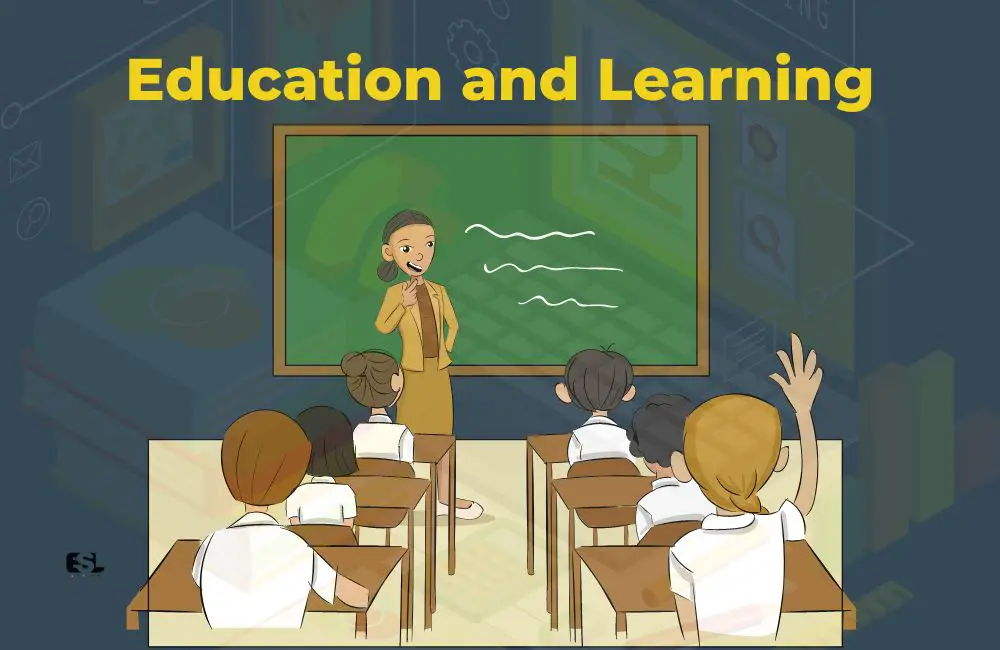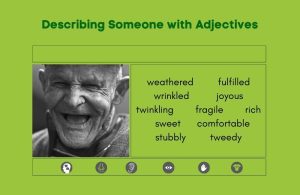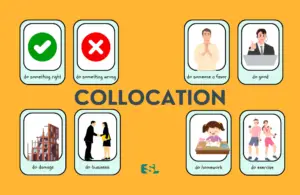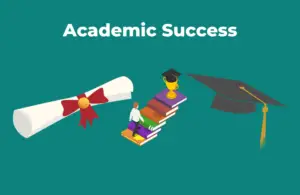In the realm of education and learning, the vocabulary that one uses can significantly influence understanding and communication. Whether you’re a student, teacher, or lifelong learner, having a robust educational vocabulary can assist you in expressing ideas, asking questions, and deepening your knowledge.
In this post, we will explore an array of terms related to education and learning that will enrich your vocabulary and enhance your academic conversations.
Table of Contents
- 1. Vocabulary for Classroom Activities
- 2. Vocabulary for Assessment and Evaluation
- 3. Vocabulary for Teaching Methods
- 4. Vocabulary for Research and Academic Writing
- 5. Vocabulary for Online Learning
- 6. Vocabulary for Educational Policy and Reform
- Sample Conversation: Using Vocabulary Related to Education and Learning
- Conclusion
- FAQ: Vocabulary Related to Education and Learning
1. Vocabulary for Classroom Activities
The classroom is a dynamic environment filled with numerous activities designed to engage students and enhance learning. Let’s look at some of the key terms that describe these activities.
| Word/Phrase | Meaning/Usage | Example Sentences |
|---|---|---|
| Lecture | A formal talk on a subject | “The professor’s lecture on quantum physics was fascinating.” |
| Assignment | A task or piece of work assigned to someone as part of a job or course of study | “She completed her assignment on time.” |
| Group work | Working with others in a group on a task | “Group work helps improve our collaborative skills.” |
| Presentation | A speech or talk in which a new product, idea, or piece of work is shown and explained to an audience | “His presentation on climate change was very informative.” |
| Seminar | A conference or other meeting for discussion or training | “The university often organizes seminars on various topics.” |
| Field trip | A trip made by students to learn about something, typically away from their school | “The students went on a field trip to the museum.” |
| Exam | A formal test of a person’s knowledge or proficiency in a particular subject or skill | “He was studying for his final exams.” |
| Workshop | A seminar, discussion group, or the like, that emphasizes exchange of ideas and the demonstration and application of techniques, skills, etc. | “I attended a writing workshop over the weekend.” |
| Homework | Work or study done in preparation for a certain event or situation | “She has a lot of homework to do.” |
| Practicum | A course of study designed especially for the preparation of teachers and clinicians that involves the supervised practical application of previously studied theory | “The teaching practicum helps education students get real-world experience in classrooms.” |
| Report | A detailed spoken or written account of something | “The students had to write a report on their field trip.” |
| Curriculum | The subjects comprising a course of study in a school or college | “The school’s curriculum is comprehensive and challenging.” |
To elevate your vocabulary in just 30 days, I recommend to my students an informative, fun, and accessible guide to utilizing powerful language. Millions of individuals have enhanced their academics, job skills, and confidence by dedicating just fifteen minutes daily to the exercises and tests of 30 Days to a More Powerful Vocabulary (Amazon Link), a top-selling. It offers step-by-step methods to bolster language prowess, discover compelling words, and daily vocabulary enhancement with pronunciation guidance.
2. Vocabulary for Assessment and Evaluation
Assessments and evaluations are critical components of the learning process. They measure students’ understanding and skills. Here are some important terms in this domain.
| Word/Phrase | Meaning/Usage | Example Sentences |
|---|---|---|
| Grade | A particular level of rank, quality, proficiency, intensity, or value | “She got a good grade on her essay.” |
| Feedback | Information about reactions to a product or a person’s performance of a task, used as a basis for improvement | “The teacher gave constructive feedback on his assignment.” |
| Mark | A score or grade for an examination or a piece of coursework | “He got high marks in his math test.” |
| Rubric | A set of instructions or rules | “The assignment rubric clearly outlined the expectations.” |
| Exam | A formal test of a person’s knowledge or proficiency in a particular subject or skill | “She passed the exam with flying colors.” |
| Quiz | A test of knowledge, especially as a competition between individuals or teams as a form of entertainment | “The students had a pop quiz today.” |
| Score | The number of points, goals, runs, etc., that each player or team has in a game or contest | “She scored 100 on her math test.” |
| Evaluation | The making of a judgement about the amount, number, or value of something; assessment | “The teacher’s evaluation of the student’s work was fair and detailed.” |
| Benchmark | A standard or point of reference against which things may be compared or assessed | “The exam results will serve as a benchmark for the student’s future performance.” |
| Peer review | Evaluation of scientific, academic, or professional work by others working in the same field | “The term paper is subject to peer review before final grading.” |
| Plagiarism | The practice of taking someone else’s work or ideas and passing them off as one’s own | “The professor uses a software to check for plagiarism in students’ assignments.” |
| Self-assessment | Evaluation of oneself or one’s actions and attitudes, in particular, of one’s performance at a job or learning task considered in relation to an objective standard | “Self-assessment is an integral part of the learning process.” |
3. Vocabulary for Teaching Methods
Various teaching methods are utilized to enhance learning and comprehension. Understanding these can help students adapt and thrive.
| Word/Phrase | Meaning/Usage | Example Sentences |
|---|---|---|
| Lecture | An oral presentation intended to present information or teach people about a particular subject | “The professor’s lecture on Renaissance art was very engaging.” |
| Tutorial | A method of transferring knowledge and used vastly as a part of a learning process | “The tutorial on how to use the software was very helpful.” |
| Demonstration | The action of showing the existence or truth of something by giving proof or evidence | “The chemistry teacher’s demonstration of the experiment made it easier to understand.” |
| Discussion | The action or process of talking about something, typically in order to reach a decision or to exchange ideas | “The classroom discussion on climate change was very informative.” |
| Hands-on learning | A form of education in which children learn by doing | “The hands-on learning approach in the science lab helped students understand the concepts better.” |
| Collaborative learning | An educational approach to teaching and learning that involves groups of learners working together to solve a problem, complete a task, or create a product | “The project-based collaborative learning activity enhanced their teamwork skills.” |
| Inquiry-based learning | An approach to teaching and learning that places students’ questions, ideas, and observations at the center of the learning experience | “Inquiry-based learning helps students become more creative and independent thinkers.” |
| Problem-solving | The process of finding solutions to difficult or complex issues | “The math teacher used a problem-solving approach to teach algebra.” |
| Blended learning | A style of education in which students learn via electronic and online media as well as traditional face-to-face teaching | “The university offers a blended learning program for working professionals.” |
| Flipped classroom | An instructional strategy and a type of blended learning, which aims to increase student engagement and learning by having students complete readings at their home and work on live problem-solving during class time | “She finds the flipped classroom model very effective for her learning.” |
| Socratic method | A form of dialogue, based on asking and answering questions to stimulate critical thinking and to illuminate ideas | “The philosophy teacher uses the Socratic method to engage students in deep thinking.” |
| Experiential learning | Learning through reflection on doing, which is often contrasted with rote or didactic learning | “The experiential learning program at the business school gives students real-world business experience.” |
4. Vocabulary for Research and Academic Writing
Research and academic writing are integral parts of higher education. Here are some terms related to these areas.
| Word/Phrase | Meaning/Usage | Example Sentences |
|---|---|---|
| Thesis | A statement or theory that is put forward as a premise to be maintained or proved | “Her thesis on genetic engineering received high acclaim.” |
| Dissertation | A long essay on a particular subject, especially one written as a requirement for the Doctor of Philosophy degree | “He is working on his dissertation in astrophysics.” |
| Abstract | A brief summary of a research article, thesis, review, conference proceeding, or any in-depth analysis of a particular subject and is often used to help the reader quickly ascertain the paper’s purpose | “The abstract of the research paper provides a brief overview of the study.” |
| Literature review | A survey of scholarly sources on a specific topic. It provides an overview of current knowledge, allowing you to identify relevant theories, methods, and gaps in the existing research | “Her literature review included an extensive range of sources.” |
| Methodology | A system of methods used in a particular area of study or activity | “The methodology section of his research outlined the research design, participants, tools, and procedures used.” |
| Bibliography | A list of the books referred to in a scholarly work, usually printed as an appendix | “The research paper included a detailed bibliography.” |
| Footnotes | An ancillary piece of information printed at the bottom of a page | “She used footnotes to provide additional context and references.” |
| Citation | A quotation from or reference to a book, paper, or author, especially in a scholarly work | “All sources used in the paper should be properly cited.” |
| Peer review | Evaluation of scientific, academic, or professional work by others working in the same field | “His paper was accepted after a rigorous peer review process.” |
| Hypothesis | A supposition or proposed explanation made on the basis of limited evidence as a starting point for further investigation | “The scientist tested the hypothesis with a series of experiments.” |
| Plagiarism | The practice of taking someone else’s work or ideas and passing them off as one’s own | “Plagiarism is a serious academic offense.” |
| Publication | The preparation and issuing of a book, journal, piece of music, or other work for public sale | “His research findings are due for publication in a renowned journal.” |
5. Vocabulary for Online Learning
With the advent of technology, online learning has become more common. Here are some terms associated with this learning mode.
| Word/Phrase | Meaning/Usage | Example Sentences |
|---|---|---|
| Webinar | A seminar conducted over the Internet | “The company regularly hosts webinars for its employees.” |
| E-learning | Learning conducted via electronic media, typically on the Internet | “E-learning allows for flexible study hours.” |
| Virtual classroom | An online learning environment that allows for live interaction between the tutor and the learners as they are participating in learning activities | “The virtual classroom software facilitates real-time interaction between students and teachers.” |
| MOOC (Massive Open Online Course) | A course of study made available over the Internet without charge to a very large number of people | “He enrolled in a MOOC to learn programming.” |
| Asynchronous learning | A student-centered teaching method that uses online learning resources to facilitate information sharing outside the constraints of time and place among a network of people | “The course uses an asynchronous learning model, allowing students to complete work at their own pace.” |
| Synchronous learning | Type of e-learning in which learners and instructors are in different locations but interact at the same time | “In synchronous learning, students attend live online lectures and participate in real-time.” |
| Learning Management System (LMS) | A software application for the administration, documentation, tracking, reporting, automation and delivery of educational courses, training programs, or learning and development programs | “The university uses a Learning Management System to manage online courses.” |
| Distance learning | A way of learning remotely without being in regular face-to-face contact with a teacher in the classroom | “Many universities offer distance learning programs for remote students.” |
| Blended learning | A mix of traditional face-to-face and online learning | “The school uses a blended learning approach to cater to diverse learning styles.” |
| Digital literacy | The ability to use information and communication technologies to find, evaluate, create, and communicate information | “Digital literacy is a critical skill in the 21st century.” |
| Forum | An Internet message board where ideas and views on a particular issue can be shared | “The online course has a forum where students can discuss course materials.” |
| Screencast | A digital recording of computer screen output, also known as a video screen capture, often containing audio narration | “The teacher shared a screencast of the lecture for students who missed the class.” |
6. Vocabulary for Educational Policy and Reform
Educational policy and reform shape the way education is delivered and impact learners at all levels. Here are some common terms in this area.
| Word/Phrase | Meaning/Usage | Example Sentences |
|---|---|---|
| Education reform | The process of changing public education | “Education reform is necessary to meet the needs of the 21st-century learner.” |
| Policy | A course or principle of action adopted or proposed by an organization or individual | “The school’s policy on bullying is very strict.” |
| Inclusion | The action or state of including or of being included within a group or structure | “The school promotes an inclusion policy for all students.” |
| Standardized tests | A test that is given in a consistent manner to ensure legal defensibility of decisions | “Many colleges require standardized test scores for admission.” |
| Curriculum development | The process of developing lessons and content for students within certain guidelines | “Curriculum development should consider the diverse needs of the students.” |
| School voucher | A certificate of government funding for a student at a school chosen by the student or the student’s parents | “The school voucher system allows parents to choose the best school for their children.” |
| Charter school | A publicly funded independent school established by teachers, parents, or community groups under the terms of a charter with a local or national authority | “The charter school offers a unique curriculum focused on arts and science.” |
| Common Core | A set of high-quality academic standards in mathematics and English language arts/literacy (ELA) | “The Common Core standards aim to prepare students for college and career readiness.” |
| Literacy | The ability to read and write | “Promoting literacy should be a fundamental goal of education.” |
| Pedagogy | The method and practice of teaching, especially as an academic subject or theoretical concept | “Effective pedagogy requires a deep understanding of how people learn.” |
| Special Education Needs (SEN) | The practice of educating students with special education needs in a way that addresses their individual differences and needs | “Children with Special Education Needs require individualized learning plans.” |
| Bilingual education | An educational program in which two languages are used to provide content matter instruction | “Bilingual education can help students become proficient in a second language.” |
If you are searching for an effective English language vocabulary builder, try Word Power Made Easy: The Complete Handbook for Building a Superior Vocabulary (Amazon Link). This time-tested classic has helped millions achieve mastery of English and improve their communication skills in business, the classroom, and in life.
Sample Conversation: Using Vocabulary Related to Education and Learning
Situation: In a cozy library nook, Aiden and Riley are discussing their experiences and challenges as they navigate their college education.
Aiden: Hey Riley, I’m considering joining a “study group” for our history class. I think it might help with “retention” and understanding complex “theories”.
Riley: That sounds like a great idea. Collaborative “learning” often provides diverse “perspectives” and can enhance “comprehension”.
Aiden: True. Plus, I find that discussing topics with peers helps in “critical thinking”. It’s different from just passive “memorization”.
Riley: Absolutely. Engaging in “debates” and “discussions” can deepen “knowledge acquisition”. By the way, have you chosen your “major” yet?
Aiden: I’m leaning towards “philosophy”. It’s a subject that has always piqued my “curiosity”, and I’m eager to delve into advanced “coursework”.
Riley: Philosophy is fascinating! It will surely hone your “analytical skills” and offer profound “insights” into various life questions.
Conclusion
A well-rounded understanding of educational vocabulary not only assists in navigating the landscape of learning but also equips one with the language skills necessary to excel academically. These terms cover a broad spectrum of areas – from classroom activities, assessment, and teaching methods to online learning and educational policies.
It’s important to note that the world of education is constantly evolving, and so is its associated vocabulary. As a learner, it’s vital to continue expanding your educational vocabulary to adapt to new learning environments and methodologies.
FAQ: Vocabulary Related to Education and Learning
1. What is a “study group”?
A “study group” is a collection of students who meet regularly to discuss and review class materials, often collaborating to enhance understanding and performance.
2. How does “retention” play a role in learning?
“Retention” refers to the ability to recall and apply knowledge over time. Effective retention is crucial for long-term understanding and application of learned materials.
3. What is the difference between “learning” and “memorization”?
While “memorization” focuses on rote recall of facts, “learning” encompasses understanding, application, and synthesis of knowledge.
4. How do “debates” benefit educational processes?
“Debates” encourage students to research, understand multiple viewpoints, and articulate their arguments, thus enhancing critical thinking and communication skills.
5. Why is “knowledge acquisition” significant in education?
“Knowledge acquisition” involves not just gathering information but understanding and applying it. It’s the foundation for developing skills and competencies.
6. What does “major” refer to in college education?
A “major” is a student’s primary field of study in college or university, leading to specialization in a particular subject area.
7. How does “coursework” differ from regular class assignments?
While regular assignments might be short-term tasks or homework, “coursework” often refers to longer, more detailed projects or research that contributes significantly to a student’s grade.
8. Why are “analytical skills” important in education?
“Analytical skills” allow students to assess information critically, solve problems, and make informed decisions, essential for both academic and real-world challenges.
9. What role does “curiosity” play in learning?
“Curiosity” drives learners to explore, ask questions, and seek answers, making the learning process more engaging and effective.
10. How do diverse “perspectives” enhance the learning experience?
Engaging with diverse “perspectives” broadens one’s understanding, promotes empathy, and encourages a holistic view of subjects.





